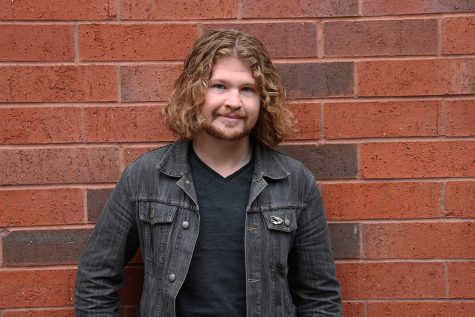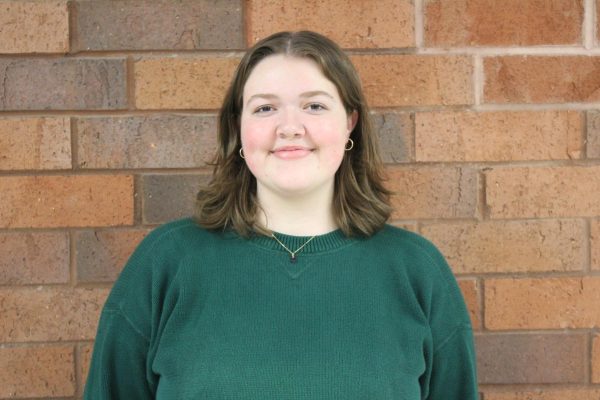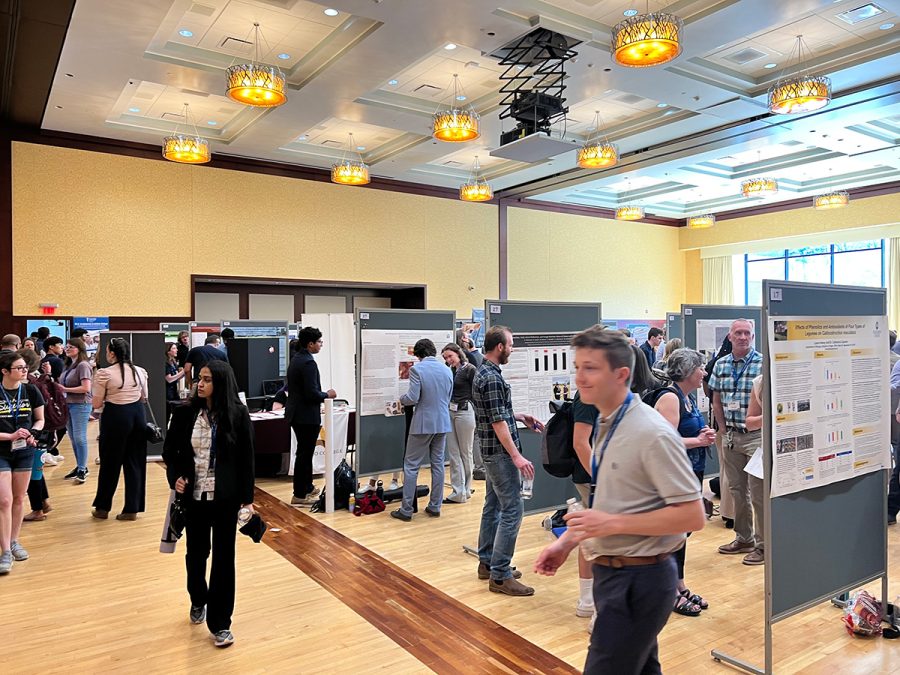UW-Eau Claire hosts National Conference of Undergraduate Research
The conference drew thousands from around the world to present research
Photo by Maddie Kasper
Student poster sessions in the Ojibwe Ballroom of Davies Student Center.
From Wednesday, April 15 to Saturday, April 18, UW-Eau Claire hosted the National Conference of Undergraduate Research, or NCUR. Classes at the school were made asynchronous or canceled for the conference.
According to UW-Eau Claire’s website, around 4,000 college students and faculty visited Eau Claire for the conference, and many hotels in the area were at capacity. Additionally, around 1,000 volunteers were needed to run the event.
The website also lists the forms of presentations that were given, such as posters, oral presentations, performances and literary readings, visual arts and galleries and collaborative artistic projects.
In response to the conference, the city of Eau Claire and the school hosted events over the course of the weekend to entertain visitors to the city, such as the Crossing the Bridge event in downtown Eau Claire, which featured a wide variety of live music on Friday evening.
One student who traveled to present at the conference was James Quezada from the University of New Mexico. Quezada worked at UNM-Valencia over the last year and a half studying cell cycle arrest in yeast, which he visited NCUR to present.
“We’re constantly testing what concentration of arsenic oxide causes what level, quantitatively, of cell cycle arrest,” he said.
Quezada shared his work via the student poster sessions, which he explained was an interesting opportunity both to share his research and see that of others.
“It was a good poster session. I had some people stop by. Probably wasn’t as busy as I’d like, but I still had some people ask insightful questions and enjoy the poster,” he said.
One of the big pulls of the conference for many was the chance for researchers to see the work of others in similar fields. Quezada stated that after presenting his own poster, he took some time to seek out other presentations surrounding chemical synthesis.
One presentation he said caught his interest in particular surrounded synthesis of natural molecules from fungus.
“I think she was trying to synthetically make this one kind of molecule that couldn’t be isolated from a natural fungus … You can just synthetically make them — just play god, kind of,” he said.
Outside his time at presentation, Quezada also took time to explore the city and take advantage of local events. This included visiting downtown and purchasing cheese curds from the Cheesy Boys food truck.
Overall, he expressed a positive opinion of Eau Claire, citing that it marked a contrast from his usual environs.
“It’s a great town. Nice weather. Friendly people,” he said of the city.
Besides those who presented at the conference, NCUR was also supported by its network of volunteers. According to the UW-Eau Claire website, students were able to sign up to volunteer individually or with a club and filled roles such as helping with parking or food lines.
Two such volunteers were Kylie Tollefsbol and Allison Lundeen, who volunteered with the Small Business Development Center and helped guide people at the Pablo Center.
“We’re greeting people, telling them where to go, what kind of events and singers and musicians are playing, kind of giving them directions on where to go,” Lundeen said.
Lundeen and Tollefsbol both said that one of the most interesting parts of the experience was the chance to meet presenters from all over.
“I think it’s cool to see all the people from around the world, because we met people from Kentucky and we saw people that were from other countries. So it’s cool to see everybody kind of come together here and be able to share what they do,” Tollefsbol said.
They also said that many visitors were surprised by the weather.
Lundeen and Tollefsbol provided some insight into the volunteer system, which they said included signing up a month before and completing training for the positions on Canvas.
“We get here like 30 minutes early, they kind of give us a rundown of what goes on, what we’re going to be doing, we meet the other volunteers and then we just go in our respective areas and help out where we can,” Tollefsbol said.
Overall, both volunteers said that one of the big benefits of the conference was the community experience it entailed.
“I think it’s just a good community event that brought a lot of people together,” Lundeen said.
Flake can be reached at [email protected].

Liam Flake is a third-year English literature and journalism student and this is his third semester on The Spectator. His passions include reading, tea, corvids and maps. He aspires to travel the world in a van and write about the experience. In his free time Flake can be found in the library or around town in a hammock.

Maddie Kasper is a third-year journalism and political science student, and this is her fifth semester at The Spectator. She covered the UW-Eau Claire Student Senate for three consecutive semesters while dreaming of being a national political correspondent. She adores poems about oranges and the Half Price Books on the east side of Madison.











